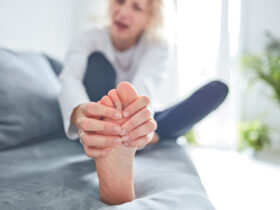By John C. Kagan, M.D. –
 This time of year in Southwest Florida brings cooler temperatures; a population boost of winter residents; seasonal sports, like football, soccer, and basketball; and unfortunately, an increase in stress fractures.
This time of year in Southwest Florida brings cooler temperatures; a population boost of winter residents; seasonal sports, like football, soccer, and basketball; and unfortunately, an increase in stress fractures.
A stress fracture is a tiny crack in the bone that usually happens from overuse. Stress fractures occur in the weight bearing bones of the body, like hips, shins, and feet, as a result of an increase in activity or too much activity. Muscles can become fatigued and unable to absorb the added shock to the body and eventually the overload of physical stress gets transferred to the bone, which causes it to crack.
More than 50 percent of stress fractures occur in the lower leg bones. Common causes of stress fractures for people during the holidays include an increase in shopping activity. Also, when youth or adults enter into new sports, there is also a period for training and practice that increases activity level which could cause stress fractures. Both examples of holiday shopping and sports participation put people at a greater risk for developing a stress fracture in their feet.
Since overuse injuries like stress fractures can be avoided, here are some tips referenced from the American Academy of Orthapaedic Surgeons to help prevent stress fractures during this busy time of year:
• When participating in any new sports activity, set incremental goals. For example, do not immediately set out to run five miles a day; instead, gradually build up your mileage on a weekly basis.
• Cross-training — alternating activities that accomplish the same fitness goals — can help to prevent injuries like stress fractures. Instead of running every day to meet cardiovascular goals, run on even days and bike on odd days. Add some strength training and flexibility exercises to the mix for the most benefit
• Maintain a healthy diet. Make sure you incorporate calcium- and Vitamin D-rich foods in your meals.
• Use the proper equipment.
• Do not wear old or worn running shoes.
• If pain or swelling occurs, immediately stop the activity and rest for a few days. If continued pain persists, see an orthopedic surgeon.
• It is important to remember that if you recognize the symptoms early and treat them appropriately, you can return to sports at your normal playing level.
For individuals that enjoy the increase in holiday shopping and want to keep the risk factors for stress fractures at bay, the key is to wear flexible and supportive shoes, along with taking breaks to rest from walking. For some, using a shopping cart can provide support from weight bearing that the body normally supports.
While stress fractures are common injuries in people of all ages, medical studies have shown that female athletes tend to experience more stress fractures than their male counterparts. Factors that increase a woman’s chance of getting a stress fracture include eating disorders, infrequent menstrual cycles and osteoporosis.
Symptoms of stress fractures include pain associated with activity, swelling and bruising. In all cases, the most important treatment for stress fractures is rest. If activity that causes the stress fracture is resumed too soon, people will run the risk of a larger, harder-to-heal stress fracture.
If you have concerns about your bone health or other orthopedic concerns, contact our office today. Dr. John Kagan has more than 30 years of experience as an orthopedic surgeon treating patients in Southwest Florida. He specializes in treating patients with knee, shoulder and hip pain, as well as general orthopedics and hand surgery. For more information go to www.kaganortho.com.
Dr. John Kagan has more than 30 years experience as an orthopedic surgeon treating patients in Southwest Florida. He specializes in treating patients with knee, shoulder and hip pain, as well as general orthopedics and hand surgery. For more information go to www.kaganortho.com







